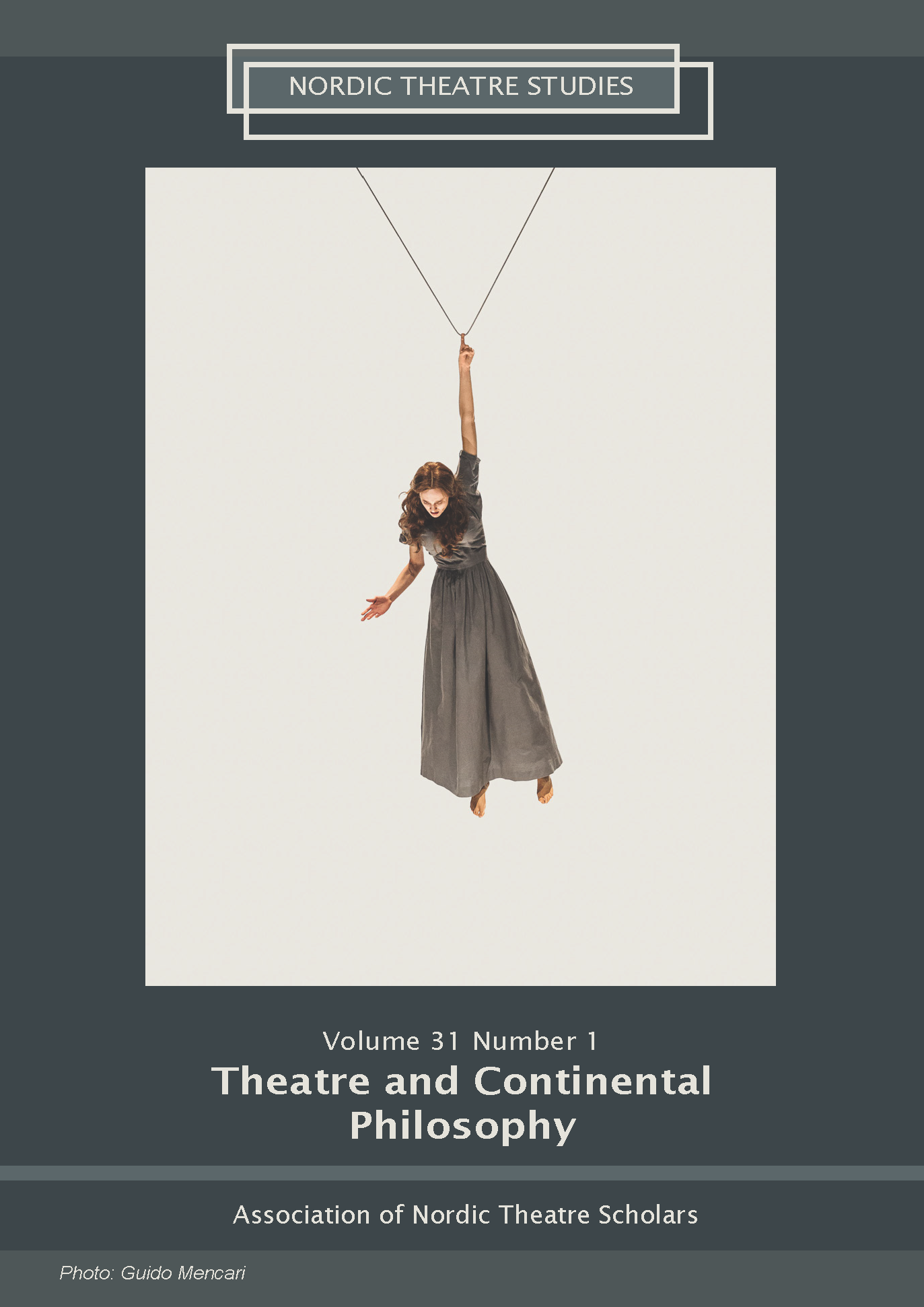Bourdieusian Concepts and the Field of Theatre Criticism
DOI:
https://doi.org/10.7146/nts.v31i1.112999Keywords:
Pierre Bourdieu, theatre criticism, field of social practice, habitus, symbolic violence, Bourdieusian Concepts, the Field of Theatre CriticismAbstract
Pierre Bourdieu’s concepts of field sociology began their life in humanities, particularly in literature and art studies after publication of his seminal Les règles de l’art: genèse et structure du champ littéraire in 1992. Regretfully, Bourdieu has not left a study dedicated to theatre, possibly due to the long-standing French tradition of considering theatre as another literary genre. Nevertheless, Bourdieusian sociology is abundant with terms, concepts, and ideas that are extremely handy in analyzing and understanding how theatre was produced in the past and is produced in the present. The appropriation of Bourdieu’s ideas for theatre studies is a tempting effort, especially considering how closely theatre is intertwined with the phenomena of habitus, distinction, and all the forms of capital described by Bourdieu himself. The aim of my article is to discuss the applicability of selected Bourdieusian notions and concepts for research of a very specific aspect of theatre studies. I argue that the concepts of field (champs), nomos, doxa, illusio as well as of symbolic violence are very useful in understanding the nature, functions, and effects of theatre criticism. Dwelling on my own theoretical research, I propose to understand theatre criticism as another field of social practice that is defined
by the conflict between the opposing interests of t
References
Anne, Bamford & Wimmer, Michael. 2012. “Audience building and the future Creative Europe Programme. EENC Short Report“. Interarts. http://www.interarts.net/descargas/interarts2562.pdf (2018-05-20).
Bastié, Eugénie. 2017 “Nathalie Heinich: “La sociologie bourdieusienne est devenue un dogme de la gauche radicale””. Le Figaro. http://www.lefigaro.fr/vox/politique/2017/08/04/31001-
20170804ARTFIG00243-nathalie-heinich-la-sociologie-bourdieusienne-est-devenue-un-dogmede-a-gauche-radicale.php (2018-05-20).
Billington, Michael. 2007. “Who needs reviews?” The Guardian Theatre Blog. https://www.theguardian.com/stage/theatreblog/2007/sep/17/whoneedsreviews (2018-05-20).
Bourdieu, Pierre & Jean-Claude Passeron. 1970. La Reproduction: éléments d’une théorie du système d’enseignement. Paris: Les éditions de Minuit.
Bourdieu, Pierre & Loïc Wacquant. 1992. An Invitation to Reflexive Sociology. Chicago: Polity Press.
Bourdieu, Pierre. 1986. “The Forms of Capital“. Handbook of Theory and Research for the Sociology of Education. Westport: Greenwood Press.
Bourdieu, Pierre. 1987. “The Historical Genesis of a Pure Aesthetic“. The Journal of Aesthetics and Art Criticism Vol. 46 / 1987, 201-210
Bourdieu, Pierre. 1995. The Rules of Art. Genesis and Structure of the Literary Field. Stanford: Stanford University Press.
Bourdieu, Pierre. 1995’. Outline of a Theory of Practice. Cambridge: Cambridge University Press.
Bourdieu, Pierre. 1996. Distinction. A Social Critique of the Judgement of Taste. Cambridge: Harvard University Press.
Bourdieu, Pierre. 2000. Pascalian Meditations. Stanford: Stanford University Press.
Bourdieu, Pierre. 2001. Masculine Domination. Stanford: Stanford University Press.
Bronner, Gérald & Etienne Géhin. 2017. Le Danger sociologique. Paris: Presses universitaires de France.
Crossick, Geoffrey a Patrycja Kaszynska. 2016. Understanding the Value of Arts & Culture.
The AHRC Cultural Value Project. https://ahrc.ukri.org/documents/publications/cultural-valueproject-final-report/ (2018-05-20).
Drobyšaitė, Evelina. 2000. “Lietuvių teatro kritikos tendencijos (1990-1997)”. Teatrologiniaieskizai. Kaunas: Vytauto Didžiojo universiteto leidykla.
Ferenczi, Thomas. 2003. “Préface”. Un siècle de critique dramatique. De Francisque Sarcey à Bertrand Poirot-Delpech. Paris: Editions Complexe.
Gaižutytė-Filipavičienė, Žilvinė. 2005. Pierre’as Bourdieu ir socialiniai meno žaidimai. Vilnius: Kultūros, filosofijos ir meno institutas.
Girdzijauskaitė, Audronė. 1997. “Neva Edikas, neva Edipas, neva pedikas”. Literatūra ir menas 05/04/1997, 10
Girdzijauskaitė, Audronė. 1997’. “Trys savaitgalio spektakliai”. Literatūra ir menas 03/05/1997,10
Hewett, Ivan. 2016. “How we’ve got it wrong about the arts”. The Telegraph. https://www.telegraph.co.uk/art/what-to-see/how-weve-got-it-wrong-about-the-arts/ (2018-05-20).
Hunka, George. 2016. “Style versus Substance: American Theatre Criticism Since 1945.” Theatre Criticism: Changing Landscapes. London: Bloomsbury.
““Ir mane durną”. Rasos Andrašiūnaitės pokalbis su teatrologu dr. Antanu Vengriu”. Literatūra ir menas 22/03/1997, 10
Jauniškis, Vaidas. 1997. “Bylos jiems nėra”. Literatūra ir menas 29/03/1997, 10
Koršunovas, Oskaras. 1997. “Postmodernizmas – tai neturėjimas kitos išeities”. Literatūra ir menas. 10/05/1997, 10
Kuznecovienė, Jolanta. 2006. “Šiuolaikinės lietuvių tautinės tapatybės kontūrai”. Sociologija. Mintis ir veiksmas. 2/2006, 84–107.
“M. Budraitis pradeda vadovauti Nacionaliniam dramos teatrui”. Lietuvos rytas. https://verslas.lrytas.lt/-12887031061287602864-m-budraitis-pradeda-vadovauti-nacionaliniam-dramosteatrui.htm (2018-05-20).
Marcinkevičiūtė, Ramunė. 2009. “Iš ten į čia“. OKT: būti čia. Vilnius: OKT / Vilniaus miesto teatras, 535–539.
McDonald, Rónán. 2007. The Death of the Critic. London: Continuum.
““P.S. byla O.K.”: nauji parodymai”. Literatūra ir menas 07/06/1997, 11
Shevtsova, Maria. 2017. “Interdisciplinary Approaches and the Sociology of Theatre Practices.” Culture Teatrali. https://www.cultureteatrali.org/ (2018-05-21).
Vanagaitė, Rūta. 2009. “Teatrinio sezono įvykis: mirusios senės pabučiavimas”. OKT: būti čia.
Vilnius: OKT / Vilniaus miesto teatras, 66–67.
Vasiliauskas, Valdas. 1997. “Režisieriaus Oskaro Koršunovo teatras, kurio net nėra”. OKT: būtičia. Vilnius: OKT / Vilniaus miesto teatras, 91–94.
Vasiliauskas, Vladas. 2009. “Iš abstrakcijų gyvenimo”. OKT: būti čia. Vilnius: OKT / Vilniaus miesto teatras, 49–52.
Downloads
Published
How to Cite
Issue
Section
License
The copyright belongs to the authors and Nordic Theatre Studies. Users can use, reuse and build upon the material published in the journal but only for non-commercial purposes. Users are allowed to link to the files, download the files, distribute the files on a local network (preferably by links), upload the files to local repositories if their institutions require them to do so, but not republish the files without proper agreements with the journal and the author.

